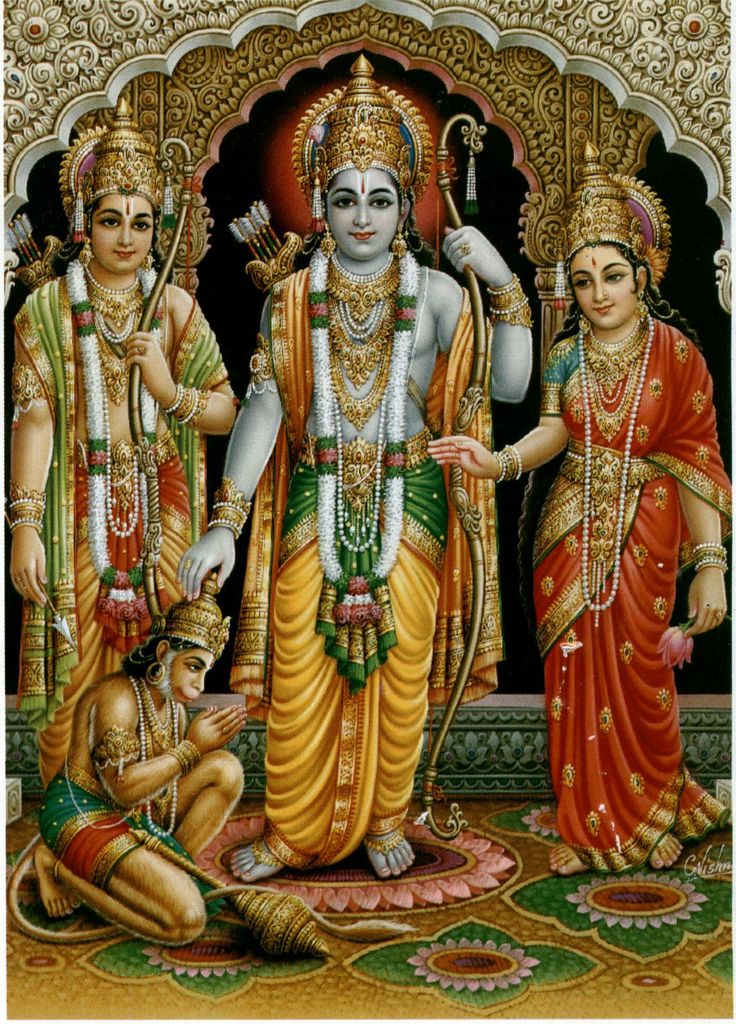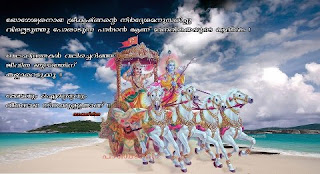The Gospel of Sri Ramakrishna -11 :
THE BRAHMANI
There came to Dakshineswar at this time a brahmin woman who was to play an important part in Sri Ramakrishna's spiritual unfoldment. Born in East Bengal, she was an adept in the Tantrik and Vaishnava methods of worship. She was slightly over fifty years of age, handsome, and garbed in the orange robe of a nun. Her sole possessions were a few books and two pieces of wearing-cloth.
Sri Ramakrishna welcomed the visitor with great respect, described to her his experiences and visions, and told her of people's belief that these were symptoms of madness. She listened to him attentively and said: "My son, everyone in this world is mad. Some are mad for money, some for creature comforts, some for name and fame; and you are mad for God." She assured him that he was passing through the almost unknown spiritual experience described in the scriptures as mahabhava, the most exalted rapture of divine love. She told him that this extreme exaltation had been described as manifesting itself through nineteen physical symptoms, including the shedding of tears, a tremor of the body, horripilation, perspiration, and a burning sensation. The Bhakti scriptures, she declared, had recorded only two instances of the experience, namely, those of Sri Radha and Sri Chaitanya.
Very soon a tender relationship sprang up between Sri Ramakrishna and the Brahmani, she looking upon him as the Baby Krishna, and he upon her as mother. Day afler day she watched his ecstasy during the kirtan and meditation, his samadhi, his mad yearning; and she recognized in him a power to transmit spirituality to others. She came to the conclusion that such things were not possible for an ordinary devotee, not even for a highly developed soul. Only an Incarnation of God was capable of such spiritual manifestations. She proclaimed openly that Sri Ramakrishna, like Sri Chaitanya tanya, was an Incarnation of God.
When Sri Ramakrishna told Mathur what the Brahmani had said about him, Mathur shook his head in doubt. He was reluctant to accept him as an Incarnation of God, an Avatar comparable to Rama, Krishna, Buddha, and Chaitanya, though he admitted Sri Ramakrishna's extraordinary spirituality. Whereupon the Brahmani asked Mathur to arrange a conference of scholars who should discuss the matter with her. He agreed to the proposal and the meeting was arranged. It was to be held in the natmandir in front of the Kali temple.
Two famous pundits of the time were invited: Vaishnavcharan, the leader of the Vaishnava society, and Gauri. The first to arrive was Vaishnavcharan, with a distinguished company of scholars and devotees. The Brahmani, like a proud mother, proclaimed her view before him and supported it with quotations from the scriptures. As the pundits discussed the deep theological question, Sri Ramakrishna, perfectly indifferent to everything happening around him, sat in their midst like a child, immersed in his own thoughts, sometimes smiling, sometimes chewing a pinch of spices from a pouch, or again saying to Vaishnavcharan with a nudge: "Look here. Sometimes I feel like this, too." Presently Vaishnavcharan arose to declare himself in total agreement with the view of the Brahmani. He declared that Sri Ramakrishna had undoubtedly experienced mahabhava and that this was the certain sign of the rare manifestation of God in a man. The people assembled there, especially the officers of the temple garden, were struck dumb. Sri Rama- krishna said to Mathur, like a boy: "Just fancy, he too says so! Well, I am glad to learn that after all it is not a disease."
When, a few days later, Pundit Gauri arrived, another meeting was held, and he agreed with the view of the Brahmani and Vaishnavcharan. To Sri Ramakrishna's remark that Vaishnavcharan had declared him to be an Avatar, Gauri replied: "Is that all he has to say about you? Then he has said very little. I am fully convinced that you are that Mine of Spiritual Power, only a small fraction of which descends on earth, from time to time, in the form of an Incarnation."
"Ah!" said Sri Ramakrishna with a smile, "you seem to have quite outbid Vaishnavcharan in this matter. What have you found in me that makes you entertain such an idea?"
Gauri said: "I feel it in my heart and I have the scriptures on my side. I am ready to prove it to anyone who challenges me."
"Well," Sri Ramakrishna said, "it is you who say so; but, believe me, I know nothing about it."
Thus the insane priest was by verdict of the great scholars of the day proclaimed a Divine Incarnation. His visions were not the result of an over-heated brain; they had precedent in spiritual history. And how did the proclamation affect Sri Ramakrishna himself? He remained the simple child of the Mother that he had been since the first day of his life. Years later, when two of his householder disciples openly spoke of him as a Divine Incarnation and the matter was reported to him, he said with a touch of sarcasm: "Do they think they will enhance my glory that way? One of them is an actor on the stage and the other a physician. What do they know about Incarnations? Why, years ago pundits like Gauri and Vaishnavcharan declared me to be an Avatar. They were great scholars and knew what they said. But that did not make any change in my mind."
Sri Ramakrishna was a learner all his life. He often used to quote a proverb to his disciples: "Friend, the more I live the more I learn." When the excitement created by the Brahmani's declaration was over, he set himself to the task of practising spiritual disciplines according to the traditional methods laid down in the Tantra and Vaishnava scriptures. Hitherto he had pursued his spiritual ideal according to the promptings of his own mind and heart. Now he accepted the Brahmani as his guru and set foot on the traditional highways.

.jpg)


Comments
Post a Comment